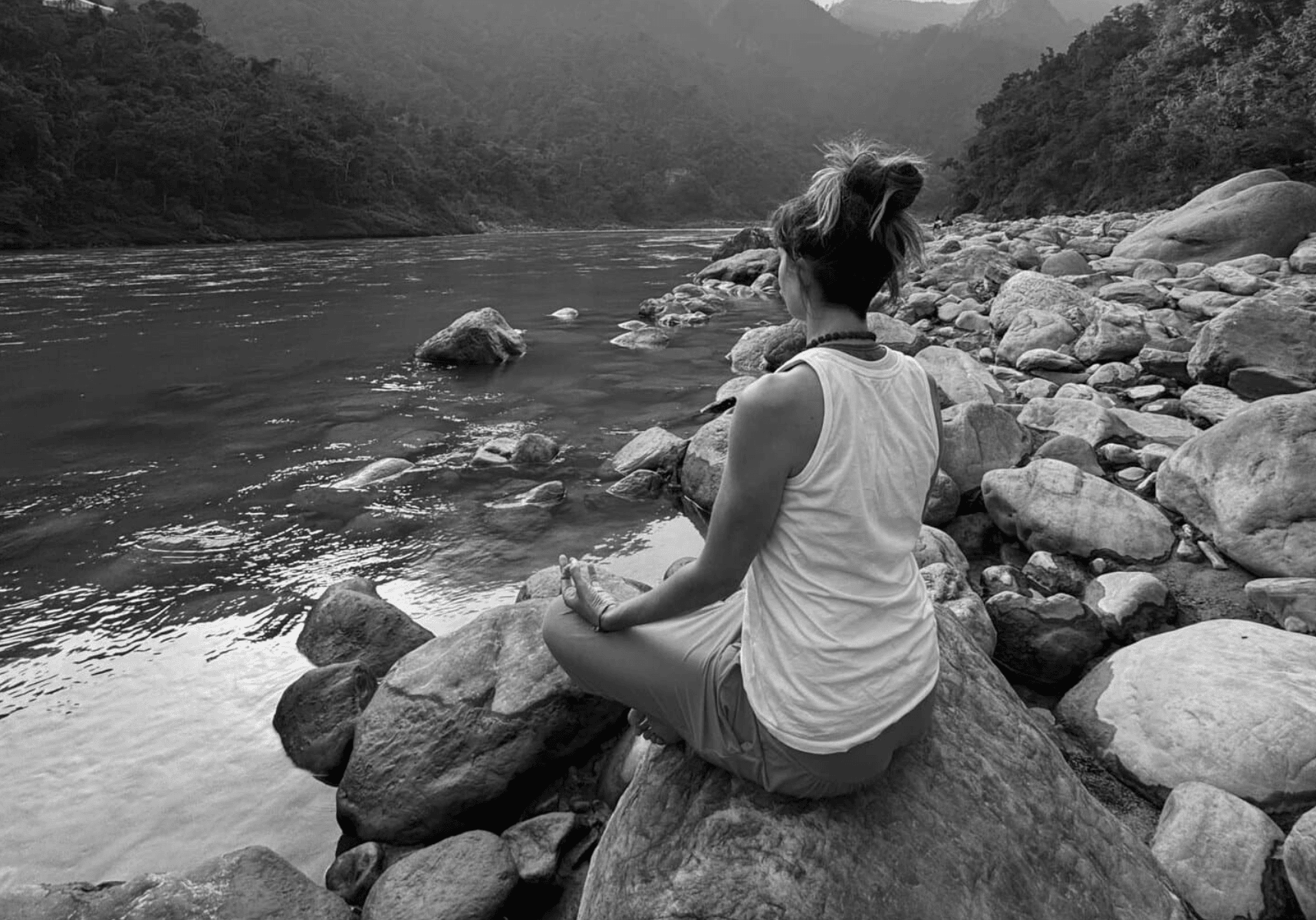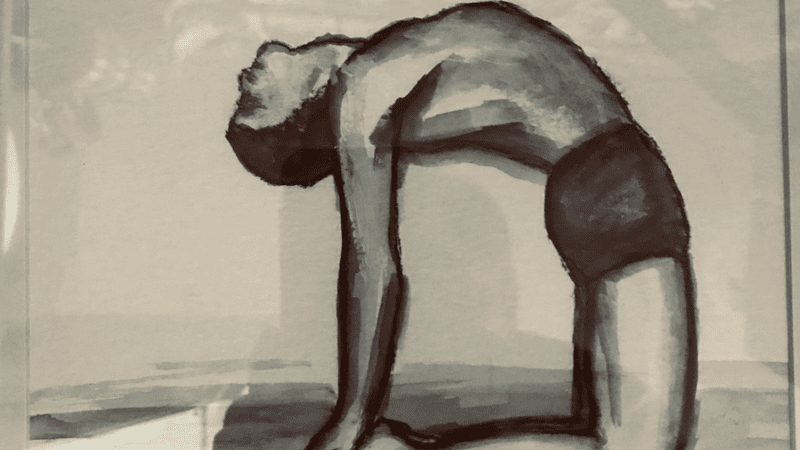
Brahmacharya
The Practice of Self-Restraint and Inner Harmony - By Louise Horne
Reading time: 5 minutes
The 4th Yama, Brahmacharya, teaches us the secret to mastering boundless energy. Understanding this moral discipline can be challenging as different teachers interpret Brahmacharya in different ways, so let's try to break it down by looking at the traditional meanings and the modern-day interpretations of this complicated and often overlooked Yama.
Brahmacharya - the 4th Yama Sanskrit Translation:
Brahma - the highest | strong, solid, expand | Supreme Cosmic Spirit in Hinduism
Brahman - the divine | ultimate | the source of creation | gender-neutral | the supreme self
Charya - the path | to move or go in the direction of
Acharya - leader | teacher
Brahmacharya - to move towards the highest
“Whatever we take in through our senses, mind and intellects, is inherently restricted by the very nature of our bodies and minds. Brahman is infinite; it cannot be restricted. Brahman must be beyond what the normal mind can comprehend; as the Upanishads declare, Brahman is ‘beyond the reach of speech and mind.’
The Vedanta Society of Southern California
Brahmacharya in the Sutras of Patanjali:
Sutra 2.38: brahmacharya-pratiṣṭhāyāṃ vīrya-lābhaḥ
When established in conservation, vigour is attained.
When walking in the awareness of the highest reality Brahmacharya is firmly established, then a great strength, capacity, or vitality (virya) is acquired.
By the establishment of continence, energy is gained.
brahma - absolute | God
carya - continence | moderation | keeping the sense strong and calm | aligned with creative energy
pratiṣṭha - upon having established | standing firmly | steadfast | point of support
vīrya - vigour | power | vital power | energy
lābha - attained | gained
(continence = exercising self-restraint, especially sexually. Latin continent - ‘holding together, restraining oneself’, from continere - contain)
Brahmacharya and sexual restraint or abstinence:
Brahmacharya is sometimes referred to as sexual restraint or abstinence. It is also the preservation and correct use of energy - its conservation, protection and direction. Some interpretations associate Brahmacharya only with the preservation of sexual energy and celibacy as it is believed that seminal fluid is our life, and when stored properly our system transforms it into prana.
Similar to a vow of chastity, the true yogi was expected to dedicate all their energy to their spiritual path. By avoiding the distractions of sex and sexual thoughts, practicing Brahmacharya conserved vital energy, allowing vigor to be preserved and greater strength, self-control and commitment to the spiritual path cultivated.
Brahmacharya is more than just conservation of sexual energy, it is one of the key practices for managing all of our physical energy, emotions and our senses too. It leads us to live aligned to our aspirations - both spiritually and in our day-to-day life habits. Practically speaking, this means that Brahmacharya turns the mind inward, enabling us to consider the consequences of our actions, balancing the senses and leading us to a path of freedom from dependencies, desires and cravings.
“…Brahmacharya suggests that we should form relationships that foster our understanding of the highest truths. If sensual pleasures are part of those relationships, we must take care that we keep our direction and do not get lost.”
The Heart of Yoga, Desikachar
Ashtanga Yoga Paris discusses that Desikachar's interpretation is perhaps easier to relate to for us today but of course this needs to be taken into context with Ahimsa (non-harming) and being Satya (truthful). So simply remaining faithful and honest could be practicing Brahmacharya according to Desikachar’s understanding. Others may feel that, celibacy is the right choice for them, even if only for a certain period during their life.
They may feel that it is more important for them to direct the energy used in sexual relations towards other areas in their life; discovering or healing themselves, devotion to their yoga or meditation practice, devotion to God. It is all finding what is most appropriate to you, at each stage in your life, while remaining open, aware, non-judging, loving and kind.
“The chaste brain has tremendous energy and gigantic will power.”
Swami Vivekananda
Brahmacharya helps us create healthy boundaries:
For the modern-day yogi, celibacy may not be desirable. We may enjoy being in a relationship and emotional and sexual connections between partners are an essential part of being together and after all, we all exist because of this sexual energy. If our relationships are balanced and we have good boundaries with each other, we communicate well and life is simple, we won’t waste energy but often we waste so much energy in inappropriate relationships which drain and deplete us.
If we are kind and honest and by our very nature a happy and joyful person, we are not seeking to extract joy from another person and when in a relationship with an equal joyful person, the navigation of that relationship then requires less effort and joy is shared.
So, we now understand that Brahmacharya is not limited to or defined by sexual activity: it is the practice of conserving our precious vital energy.
“Brahmacharya is continence of body, speech, and mind.”
BKS Iyengar
Brahmacharya in The Bhagavad Gita, the Upanishads and Vedanta Philosophy:
Brahman is a significant concept in the Vedas and it is extensively discussed in the early Upanishads. In dualistic schools of Hinduism, Brahman is different from Atman (self). In non-dual teachings, Brahman is identical to Atman, it is everywhere and inside each living being, a connected spiritual oneness in all of existence. Like e a drop in the ocean, Atman merges into Brahman. Brahman guides us, it is the true source of infinite creation.
In the Bhagavad Gita and the Upanishads the concepts of self-restraint, moderation and discipline are mentioned as some of the key principles for spiritual practice and self-realisation. The essence of Brahmacharya can be found in verses that emphasise control over the senses, moderation in actions and conservation of vital energy for spiritual progress. For example, in the Chandogya and the Brihadaranyaka Upanishads, there are teachings that emphasise the importance of Brahmacharya in the pursuit of knowledge and spiritual growth.
In Vedanta philosophy, Brahmacharya is also considered an essential aspect of spiritual practice. Vedanta teachings emphasise the importance of controlling the mind and senses, cultivating virtues such as restraint, purity and detachment, all of which are in line with the principles of Brahmacharya. The essence of Brahmacharya, understood as moderation and channelling one's energies towards spiritual pursuits, is implicit in Vedanta teachings on the path to self-realization and liberation (moksha).
If you are on the path of the divine, you are a Brahmachari. A Brahmachari wakes up every day in the morning with joy and goes to sleep every evening content. In between, they do whatever is useful to everyone, activities that are never about themselves. The word also refers to a vow of celibacy taken by a sannyasi (a Hindu renunciate who has formally renounced worldly life and dedicated themselves entirely to spiritual pursuits).
To be on the path of the divine means you have no personal plan of your own. You simply do what is required. The ancient yogis were taught how to harness all their vital life energy for the sole purpose of achieving oneness with the Divine. This path requires a lot of energy and dedication is required, therefore Brahmacharya did not only apply to sexual relations but to diet, day to day tasks, friendships, thoughts and conversation.
Sadhguru explains it like this:
Brahmacharies are an investment for the future, to keep spirituality in its pristine purity and transmit it from generation to generation. A small, core group of people are needed. They are initiated in a particular way which turns their energies in a completely different direction. Everyone need not take that step, nor will we take everyone because it is not necessary.
All of us have eaten mangoes, but how many of us have planted mango trees, made them grow, and then eaten mangoes? Most people have eaten mangoes because someone else planted the mango trees. In every society, out of a thousand people, at least ten people have to take care to plant mango trees.
Similarly, a few people have to take the path of brahmacharya. People who are willing to dedicate themselves to others’ wellbeing are needed in society. If there is no one thinking about others’ well-being, that society is definitely heading for ruin. That is what has happened to society right now. There are very few people thinking of everyone's well-being.
In Vedic culture, Brahmacharya is the name of an unmarried religious student in the first of the four stages of life. Aspiring students spent all their time with a spiritual teacher. However, in the context of the Yamas, Brahmacharya refers to a middle path of restraint. Overindulgence can deplete your vital force; leaving you insecure and anxious. The middle path allows you to enjoy the control of your senses rather than letting uncontrolled senses spoil your enjoyment of life. Brahmacharya is often mistranslated as celibacy, but perhaps that lacks the holistic context of the Yoga Sutras.
“Whenever human or natural energy is restrained, be it emotional, intellectual, psychological or physical, a great amount of power is stored up which can be utilised in various ways. Scientists, inventors, artists, scholars, philosophers and other creative personalities rely on this scientific natural principle. Similarly, Brahmacharya transforms the procreative energy into pure, spiritual energy or Ojas (see notes below explaining Ojas), which dwells in the pure mind. This incomparable benefit surpasses all other gains”
Swami Tathagatananda
What is Ojas?
Ayurveda is the traditional Hindu system of medicine using diet, herbs and yogic breathing. It is focused on the idea of balance in bodily systems and Ayurveda defines Ojas as ‘vigour’ - the vital energy that nourishes every cell and tissue in the body and is responsible for the optimal functioning of our body, mind and spirit. Ojas improves brain power, builds nerves and calms the mind.
To help define Ojas further, think of going for a run - your physical energy gets your legs moving but the Ojas gets you inspired to get your trainers on and get out the house to start the run, your willingness to get moving. This subtle force drives you, no matter the circumstances. Ojas is different from those temporary bursts of energy that you get from coffee, sugar or alcohol, it is a sustainable energy that builds up within you over time when you follow the path of Brahman.
Ojas is considered the body’s natural essence providing strength and vigour from within. When Ojas is weak our thoughts may be blurred, it can affect mental ability and decision making, we might also feel restless and uneasy.
Different ways Brahmacharya is be translated today:
Moderation and wise use of energy | Directing creativity responsibility | Energy protection | Your energy, your responsibility | Energy mastery | Mastering and conserving our energy | Self-restraint | Moderating the senses | Restraining our energy | Managing sensory cravings | Transforming habits that are out of sync with our spiritual aspirations | Consciously directing energy
The modern-day disciple - Understanding how Brahmacharya applies to our lives today:
We are all made of moving energies, just like the electricity that runs through the power cables, our life force/prana flows within us. If we waste electricity we are left with a large bill and unnecessary environmental damage, so it must be used wisely. Similarly, if we waste our own internal energies, we feel tired, out of balance and may not have the energy to do the things that are important to our well-being. We are essentially an abundant resource of energy just waiting to be mastered through the wisdom of Brahmacharya.
“Nothing is wasted by us if we seek to develop moderation in all things.”
TKV Desikachar
We are not all on a strict path to enlightenment but to create anything worthwhile in your life takes dedication. There may be times simple pleasures have to be denied to keep our focus - maybe lack of sleep, missing family events, not going out with friends because you know that what you are trying to achieve takes time and commitment and you want to feel bright and with a sharp mind.
Therefore, perhaps in a small way, similar to a Brahmarchari, you understand that because of your dedication to achieve your goal, your attention is unmitigated and perhaps detached from other things that some people think are valuable.
Over or under indulgence causes problems in the long term. Sunlight as an example - too much we burn our skin, not enough we lack vitamin D. Brahmacharya reminds us there is a middle way and if you are very conscious, Brahmacharya does not involve anything. But when our senses engage with the external world, they encounter many delights, and this can throw us of balance.
Even the strongest among us might overindulge sometimes and maintaining this middle way in a world overloaded with stimuli is a tough challenge but we must remind ourselves that constant “doing” wastes energy. We are so busy we might forget to meditate, or we choose to work out in a stuffy gym rather than be out in the fresh air connecting with nature. Maybe we find ourselves gossiping when someone has annoyed us, we grab some unhealthy convenient food in-between meetings. Or we lack connection as we are so busy, so perhaps we seek out inappropriate relationships. Before we know it, we are off balance and out of harmony with ourselves and nature.
Every decision we consciously make relates to how our energies are used and making wise choices about the food we eat, the company we keep, even the television we watch, helps us master those energies and not waste them. Saving our energy for positive growth.
Robert Svoboda explains in his book ‘Prakriti: Your Ayurvedic Constitution’ that a helpful method for evaluating the quality of a sense experience is to examine how well you are able to digest it.
He points out that digestive problems are not limited to the stomach, but we also digest experiences in the mind. Svoboda suggests that when sleep is disturbed by our thoughts, or we have unwelcome emotions after an experience or even if we are hiding our actions from others, we need to take notice. The true measure of our thoughts and actions is the effect on your emotions, mood and energy levels. How do we digest the experiences of the senses?
Reverend Connie L. Habash explains that restraining our life force through all our thoughts, words and actions is a constant battle with ourselves and mastering our energies takes many years of dedication and practice to establish oneself in Brahmacharya. It requires us to master all our behaviours, rather than allow them to unconsciously control us. Thoughts and feelings will still come and go, but we must learn to be unattached (see Aparigraha) to see what arises and be able to release it at will.
Don Miguel Ruiz, author of ‘The Four Agreements’, calls this mastery “Being Impeccable”.
“Established in Brahmacharya, one develops a fund of vitality and energy, a courageous mind, and a powerful intellect… Brahmacharya is the battery that sparks the torch of wisdom.”
Iyengar
When we are young our energy is boundless and often the way we use it is misguided, but as one ages, we begin to realise how precious it is. Whether you are seeking spiritual enlightenment, or you simply wish to feel well and at peace with your inner self and find the ability to stick to the goals you set yourself, Brahmacharya helps us find the restraint at any age to not be pulled of track by distractions. Brahmacharya gives us practical ways to manage our senses, so we can wake up each and every morning with a continued sense inner contentment. It teaches self-restraint by offering us a deep sense of divine joy and inner tranquillity.
As we learn to quieten our mind, we can begin to notice the activities which drain our energies. Talking and thoughts use a lot of vital energy – needless gossip, filling the silence with useless information. Self-restraint can be easier if we accept each moment just as it is. Time is precious - it is not to be wasted and it must be valued.
Every thought we have is an outflow of energy and worries about the future, regrets about the past or looping thoughts of conversations that may never even happen all consume mental energy. Energy is also wasted on digesting rich food, complaining, daydreams, desires or sexual fantasies. When we become obsessed with something, we highlight our weaknesses.
Perhaps it’s time to fast, take time away from your phone or emails, be silent for a while and eat simple food. In his book ‘The Secret of the Yama’, John McAfee explains that rather than becoming attached to the experiences of the senses, we should try to enjoy them as they arise and then let them go, opening ourselves up to whatever new experience might arise in the next moment. He explains that “Sensuality is the root of all desires”.
Practical ways to help us walk with Brahman:
- Direct your energies to something positive each day - allow time to be in nature, notice the flowers, listen to the birdsong, or watch the clouds.
- Use your time wisely - appreciate it. Do not undervalue time or let it slip away, wasting it on unnecessary or negative things you can’t control.
- Consider whether you are wasting money on unnecessary things that bring fleeting moments of pleasure. It takes time to earn that money – spend it wisely.
- Give yourself guilt free breaks from your phone or social media.
- Notice the way you do things - Are you ego led? Do you go to work reluctantly or in good spirits?
- Sit in silence, maybe even darkness too - watch your thought patterns. What does you body need right now?
- Consider deepening your spiritual awareness.
- Discover your creative side - self-expression through creativity (2nd chakra work) transforming emotional energies. Music, painting, writing, even gardening to cultivate our creative energies.
- Think about what you eat and drink - is it helpful or harmful?
- Review relationships with family, friends and work colleagues - who brings you joy and who drains you? This one can be a hard one as when you take away the things that brought you together as friends, it may be difficult to find common ground again. You may even lose touch with certain people because of your new life choices but this will create space for new friendships. Change starts from within, and you only have control over your actions. If other people are choosing not to live in alignment to your new ways, you can’t control that. Accept that is the way it is.
- Use your words wisely. Speak kindly - to yourself and others.
Yoga and Brahmacharya:
Patanjali states that energy is conserved when we remove our attention from the sense pleasures and conserve our energy and Brahmacharya is a reminder to work a little harder at that and to redefine our Samskaras (the subtle impressions of our past actions) and to foster new thought habits. Yoga will absolutely help support you in that process.
- Asana to restore internal energies and realign chakras. Encourage self-acceptance with somatic movements or express your creativity with vinyasa flows. As you move be aware of each muscle that is engaging and holding you steady (sthira). We all have that one place we hold our tension… the shoulders, brow or tummy perhaps. Practice energy awareness in asana practice - in locust pose are the shoulders holding tension unnecessarily? Are you clenching your jaw muscles in balances? Train your body to direct the energy to the muscles needed in each pose.
- Yoga philosophy study for self-enquiry and self-study.
- Breathwork to soothe your nervous system.
- Mantra (Japa) to transform emotional energies. Repeating words, hymns or sounds also aid concentration. Maybe start with So’hum ‘I am’ (In Vedic philosophy So’hum means ‘I am one with the Universe and all of creation’)
- Meditation to calm the senses (the best time is between 4 and 6am, before sunrise, this sacred time is called Brahmamuhurta, the Brahmic time, or divine period).
Brahmacharya - the boost we need to ignite change:
We live in a world of constant distraction, being busy has become what we are used to. Our minds are exhausted, and we are wasting our vital life force. By beginning to really take notice of every aspect of our life, we notice how outside influences throw us off balance. When you pay attention, you feel that happening. Notice which of your ways of living and thinking are depleting your energy and which parts of your life are refreshing and restoring you, bringing vitality and energy. Soon the reasons will become apparent and then it’s time to begin to make changes.
The focused brain has energy, will power, dedication to achieve quicker than an unfocused mind. Control of the mind brings us back to why we are here, back to the path we feel deep inside that we want to follow. Allow yourself to be led by Brahmin, guiding you to fulfil your potential, the reason you are here, your dharma (in alignment with your true purpose, to cosmic law/nature).
Use the energy you are conserving to create good, maybe even lead or teach others (acharya = to lead). What is it that you are apprehensive about? What is that you think you are not good enough at? Now is the right time, feel it when you meditate… trust. Mistakes will be made along the way of course but that's how we learn.
Maybe, through that mistake, another path arises and without attachment to the old, we are led down a new path. But along all of those paths we are learning, being kind to others along the way and always listening to the inner, quiet voice that guides us - the voice of Brahman. Then we begin to become aware of a happiness that is not dependent on external influences, and we discover a deep heart-felt joy and vibrancy that needs no explanation.
Love and kindness,
Louise
References:
The Vedanta Society of Southern California
The Yoga Sutras of Patanjali by Sri Swami Satchidananda
AwakeningSelf.com
Rolf Sovik
VedantaNY.org
Constance L. Habash
AshtangaYogaParis.fr







